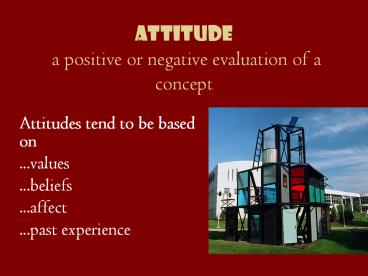Attitude a positive or negative evaluation of a concept
1 / 13
Title:
Attitude a positive or negative evaluation of a concept
Description:
Title: Attitude a positive or negative evaluation of a concept Author: Preferred Customer Last modified by: tan Created Date: 2/7/2002 7:15:32 AM –
Number of Views:333
Avg rating:3.0/5.0
Title: Attitude a positive or negative evaluation of a concept
1
Attitude a positive or negative evaluation of
a concept
- Attitudes tend to be based on
- ...values
- ...beliefs
- ...affect
- ...past experience
2
Values
- enduring beliefs about important life goals that
transcend certain situations - Symbolic Values long standing values
internalized early in life - Instrumental values are based on direct costs
or benefits of the attitude object.
3
Bogus Pipeline
- (Page and Sigall, 1971)
- An instrument designed to induce the belief that
it was truly measuring attitudes. "Bogus pipeline
to the heart". - Used to elicit a person's true attitude.
4
LaPiere (1934)
- Cross - country with the Chinese Couplewent to a
hundred hotels and restaurants.
5
WHY DO ATTITUDES NOT ALWAYS MATCH BEHAVIOR??????
Level of Attitude Specificity Time
Factors Private vs. Public Self-Awareness
Attitude Accessibility
6
Attitudes based on Behavioral Processes
- 1) Instrumental Conditioning
- 2) Self Perception
- 3) Facial feedback
7
Affective Processes
- Mere Exposure
- Classical Conditioning
8
Theory of Planned Behavior
- (Fishbein Azjen, 1975)
- The theory that contends that people's conscious
decisions to engage in specific actions are
determined by their - attitudes toward the behavior in question,
- the relative subjective norms,
- and their perceived behavioral control.
- Criticisms of the Theory of Planned Behavior
- --spontaneous behavior
- --habits
9
Cognitive Consistency
- the tendency to seek consistency in one's own
cognitions. - Dissonance a feeling of discomfort while
performing an action that is inconsistent with
one's attitude.
10
You want your attitudes and behavior to match.
If they do not, you can either change your
attitude or your behavior.
11
- Insufficient Justification I wouldnt lie to a
friend but I lied to a friend. - Freedom of Choice I hate girls and I sat next to
a girl - Justification of Effort If I worked this hard
for something, I must really want it. - Post Decision Dissonance I made the right
decision to stay in Iowa
12
Self Perception Theory
- When people behave inconsistently, they first
seek explanations outside of themselves to
explain their behavior--when they can't find a
probable external cause, they assume the cause
may be internal.
13
Self Affirmation Theory
- Explanations based on the notion that people are
not concerned about maintaining consistency in
their thought, but instead are motivated to
reaffirm the general integrity of the self. - http//www.youtube.com/player.swf?video_idvEWLwz6
JRNEl357sB4BC76752 - http//www.hrtwrk.com/video/gooddoctor.mov































